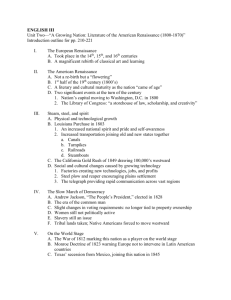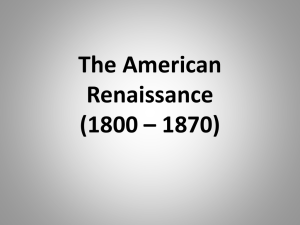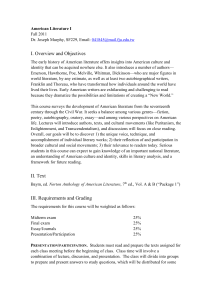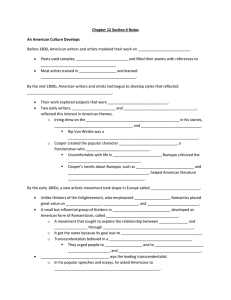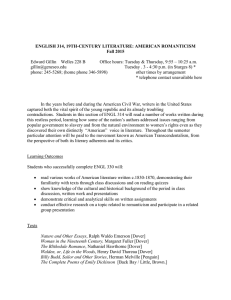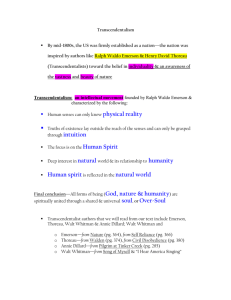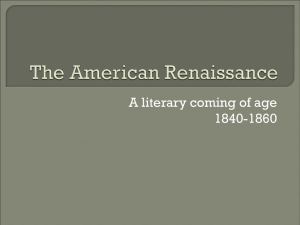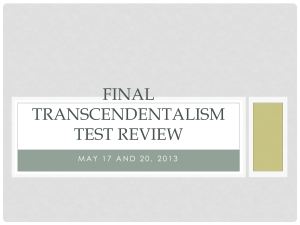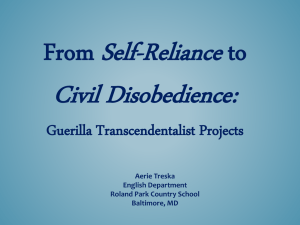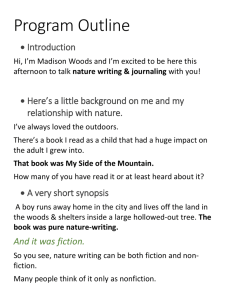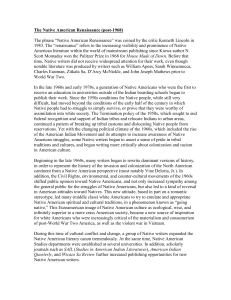Unit 2
advertisement
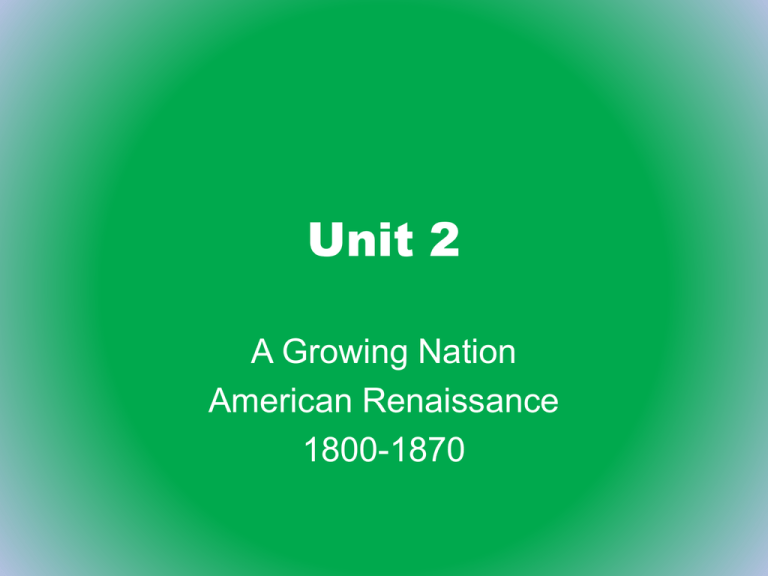
Unit 2 A Growing Nation American Renaissance 1800-1870 1870 • Industrialism, population growth, economic changes, and the Civil War had aged a youthful nation’s spirit, but also gave way to great American writers like Irving, Poe, Emerson, Thoreau, Dickinson, and Whitman 19th Century American inventions • • • • • • • 1807 – Steamboat 1814 – Iron-tipped plow 1835 – Sewing Machine 1845 – Porcelain false teeth 1857 – Passenger elevator 1863 – Roller skates 1863 - Typewriter The American Renaissance • The European Renaissance was the rebirth of classical art and learning in the 14th-16th Centuries • The American Renaissance was NOT a rebirth but more of a flowering or growing of literary and cultural maturity – Capital moved to Washington, D.C. from Philly – Library of Congress founded Steam, Steel, and Spirit • Physical and technological growth • 1803 – Louisiana Purchase doubled nation’s size – National pride and self-awareness – Canals, turnpikes, and railroads expanded • 1849 – Gold Rush in California • Factories and Industry in the Northeast created jobs – Steel plow and telegraph Slow March of Democracy • 1828 – Andrew Jackson – the People’s President – No land ownership required to vote – Women still not permitted to vote • 1838 – Trail of Tears forces many Native Americans west as their tribal lands were confiscated World Stage • 1812 – War of 1812 convinced Europe that the US was on the world Stage • 1823 – Monroe Doctrine warns Europe not to interfere with Latin America • 1830s – Conflict with Mexico over Texas • 1845 – Texas joins Union (Florida becomes a state too) • 1861 Civil War Relationship between Place and Literature • Americans inspired by land – size of nation and vast differences in landscapes • Americans realized that continent held many commercial possibilities • Physical grandeur inspired Americans to reach for vast possibilities • Explorers and writers create American Mythology in the vast wilderness and forests Winds of Change • Prosperity brings problems – Child Labor – Unsafe working conditions – Fierce competition • Slavery – still a huge issue of contention – Builds to Civil War in 1861 Renaissance Literature • American Classics – writers such as Poe, Hawthorne, Melville, Emerson, Thoreau, and Dickinson • American Mythology – writers such as Irving, Cooper and Longfellow Authors • Poe, Hawthorne, and Melville – dark side of human spirit • Emerson and Thoreau – nature • Dickinson – local landscape • Whitman – self and nation Literature reflecting society • Technology – bigger, better, faster, and stronger – Americans want MORE • America is moving towards a different democracy – all WHITE MEN can vote • Slavery is a contentious issue • Americans still reading British classics like Dickens and Scott, but American authors are gaining ground Three Visions • Social – How the New World rivaled the Old World – Frontiersman • Romantic – exploration of private self was as important as land expansion (imagination over reason) – Individualist • Transcendental – real truth is outside sensory experience (nature and spiritual merge) – Seeker What makes American literature American? • Local dialects emerged and local grammar and syntax change as British English, Spanish, French, Dutch, and Native American languages merged • Colloquial English becomes common – more informal than stuffy British English • “Barbaric Yawp” – Whitman’s style that incorporated all of the languages and dialects of various areas of the country • Frontiersmen like Daniel Boone and Davey Crocket become topics of folktales Romanticism • Emphasizes the individual over the institution – Ex. Hester Prynne vs. Church, Captain Ahab vs. logic and safety • American myth started with “a city upon a hill” (Boston) and eventually becomes a garden as western expansion makes writers realize there is a vast canvas of possibility • Romanticism has two faces – Bright and optimistic – humans are fundamentally good – Dark and shadowed by evil – humans resort naturally to crime, cruelty, and self-destruction • Self-reliance – Thoreau and Emerson urged Americans to trust themselves and think for themselves
